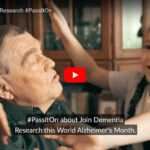Archives
#PassItOn about Join Dementia Research this World Alzheimer’s Month
1 September 2021

September is World Alzheimer’s Month and this time each year, people from around the world come together to raise awareness about dementia. September 2021 marks the tenth year of this important global awareness campaign. Rates of dementia are increasing; every three minutes, someone in the UK develops dementia. There are currently 850,000 people in the […]
Online studies open!
24 August 2021

Did you know that many of the studies on Join Dementia Research are open to anyone over 18 without a dementia diagnosis? These tend to be online studies, which can be done at home, at a time to suit you. Because these studies are keen to attract a large number of people they run for […]
RadioMe
16 August 2021

The beneficial aspects of listening to music such as calming anxiety, reducing stress and inducing a relaxing effect, are being tested in a new study for people living with dementia. The context As well as experiencing cognitive decline, people with dementia often also suffer from ‘neuropsychiatric symptoms’ such as depression, irritability, anxiety and hallucinations. In […]
PRESIDE A singing study!
12 May 2021

It is well documented that music and singing are beneficial to those living with dementia. Listening to or singing songs can provide both behavioural and emotional benefits and the power of music can unlock memories and help provide links to a person’s past and promote connection with carers. Researchers at Nottingham University are looking for […]
Exploring the relationship between Lewy body dementia and delirium
19 April 2021

Lewy body dementia (LBD) is one of the most common forms of dementia. The symptoms of LBD can affect a variety of brain functions including; thinking, attention, sleeping and perception. It is often difficult to diagnose and can appear similar to other medical issues such as delirium. Researchers at the University of Cambridge are looking […]
Study into making financial services dementia-friendly
23 March 2021

Dementia can impair the ability of the individual to manage their financial affairs. This means that they will require support from family members in ensuring good financial outcomes and protection. Often those living with dementia enter into a power of attorney agreement that empowers a named person to act on their behalf and assist them […]
Join us in celebrating 6 years of dementia research
24 February 2021

As we turn six today, we are celebrating not only six years of bringing researchers and volunteers together, but also our collective achievement of helping dementia research to keep going during the pandemic. See what our volunteers, charity partners and researchers have to say about us! Since Join Dementia Research began, an incredible […]
Can remotely delivered real-time health coaching improve cognition?
1 February 2021

As we get older we tend to spend more time being inactive – up to 60% of older people report sitting for more than four hours per day. The positive impacts of exercise on our physical health are well known, but researchers at Anglia Ruskin University are looking into whether remotely delivered coaching aimed at […]
Adjusting dementia support studies in response to the COVID-19 pandemic
14 January 2021

Certain Join Dementia Research studies have adapted to an online offer so that researchers can continue to gain important insights, and ultimately help to support those living with dementia during the COVID-19 pandemic. Beyond the margins Researchers at Durham University, the University of Edinburgh and their partners Innovations in Dementia are developing and testing a […]
Air your opinions on how COVID-19 is affecting you
30 October 2020

Would you like to take part in a research study by anonymously sharing your feelings via your smartphone? Researchers at University College London are investigating the impact of COVID-19 on people’s physical and mental health, together with their attitudes to the pandemic and their thoughts on the public health strategies that have been put in […]
